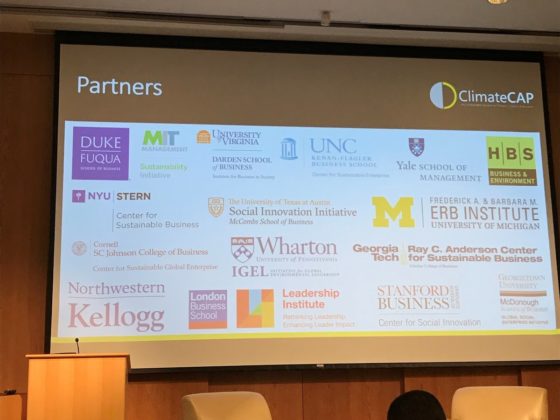The Institute for Business in Society recently welcomed educator and consultant, Mary Gentile, and her Giving Voice to Values (GVV) curriculum to the Darden School. Below is an interview with Professor Gentile about GVV, its approach, and what makes it different from other Business Ethics programs.
Q: What is GVV?
A: GVV is an innovative approach to values-driven leadership development in business education and the workplace. Piloted in nearly a thousand schools, companies and other organizations on all seven continents and growing, the Giving Voice to Values curriculum offers practical exercises, cases, modules, scripts and teaching plans for handling a wide range of ethical conflicts in the workplace.
Drawing on the actual experience of business practitioners as well as social science and management research, GVV helps students, business leaders, employees, and other practitioners identify the many ways that individuals can and do voice their values in the workplace, and provides the opportunity to script and practice this voice in front of their peers.
Q: What Makes GVV Unique?
A: Unlike many other Business Ethics curricula, GVV is not about persuading people to be more ethical. Rather, GVV starts from the premise that most of us already want to act on our values, but that we also want to feel that we have a reasonable chance of doing so effectively and successfully. This pedagogy and curriculum are about raising those odds.
Rather than a focus on ethical analysis, the GVV curriculum focuses on ethical implementation and asks the questions: “What if I were going to act on my values? What would I say and do? How could I be most effective?”
Q: Who Can Use GVV?
A: As noted above, to date, GVV has been piloted in nearly one thousand schools, companies, professional associations and other organizations on all seven continents and has an extensive network of thousands of contacts across the globe. Originally designed for use in graduate business school curricula, GVV has now moved well beyond that.
Whether you are a professor, student, corporate leader or practitioner in business, government, medicine or another field, Giving Voice to Values (GVV) provides the practical tools and skills needed to effectively voice and act on your values in the workplace.
Q: What do recent news events at companies like Volkswagon, Mylan and Wells Fargo tell us about why current approaches to business ethics don’t seem to be working?
A: The challenge appears to be not just one of recognizing ethical issues when they arise or learning to think them through–we are all practiced from toddler age with the skill of generating rationalizations for our choices. The challenge, rather, appears to be one of preparing managers for action: what do you do and say once you know what you think is right? Business ethics doesn’t spend enough time on that, unfortunately.
Q: What is it that so often stops us from acting on our values at work when we know what is right?
A: We all can generate a list of what makes this hard to do: we feel alone; we wonder if we’re being naïve; we wonder if we’re misinformed (or we want to believe that perhaps we are); we wonder if our boss will be receptive; we anticipate that we will encounter “push back” if we raise the issue and we don’t know what we’ll say when that happens; we worry about being ostracized or worse if we appear not to be a “team player.”
Q: Briefly, what can individuals do differently to ensure that we speak up about and act on our values?
A: First of all, we can reflect on our own histories. In my experience, I have yet to encounter someone who cannot honestly say that they have never voiced and enacted their values at some point in their lives; but I’ve also never encountered someone who cannot think of a time when they failed to do so as well. So the point here is that we all are capable of both and the objective of my work is to help expand the skills, the comfort and the confidence so that we can voice our values more often and more effectively.
Once we take this perspective, it’s all about practice. The typical kinds of values conflicts we will encounter are often predictable. Because they are predictable, there is the opportunity to anticipate the “reasons and rationalizations” we will hear in defense of the conflicted practice, and to literally craft “scripts” and action plans, and practice delivering them with supportive peer coaches. Just as an athlete practices his or her moves to commit them to muscle memory, the point here is to make voicing/enacting our values – thoughtfully and effectively – the default position.
Q: What can organizations do to better protect themselves and their employees from ethical transgressions?
A: They can share stories of times when individuals have, in fact, voiced and enacted their values effectively. They can provide opportunities for employees to practice their scripts and to engage in peer coaching. Perhaps, most powerfully, leaders can share the stories of how they themselves found ways to think through and enact their values, not as self-serving tales of heroism, but as examples of how values conflicts are a very “normal” part of our organizational lives and need to be met with the same thoughtful, calm and focused attention we would bring to any other business decision.
Q: How can we build a network of allies — up and down the organizational chain of command — to share our ethical concerns?
A: By normalizing the experience of values conflicts in the workplace, we make them discussable. We start from the position that most of us would like to act on our values if we thought we could do so effectively, so this is less about preaching or judging and more about asking an interesting question about innovation and implementation: “WHAT IF you knew what you thought was right? How would you get it done, effectively?”
The way you show you’re smart and savvy in such a conversation is not by taking the cynical position, but rather by figuring out how to actually do what some might say is impossible. It becomes an ongoing skill-building endeavor and leadership practice.
Q: You say in your book that “sometimes the most effective arguments we can craft in the service of our values are the ones we least expect.” What do you mean?
A: Part of the process of creating our values scripts entails identifying what’s at stake for everyone. In the process of doing this, we sometimes learn that what is motivating the other person is more easily addressed without going to a place of moral righteousness. The other person may simply be trying to protect themselves from criticism further up the line.
By acknowledging that, and trying to problem-solve with him or her, we can sometimes engage them in our efforts more easily than if we simply argued that their stance was “wrong.”
Q: Could you describe the experiences of individuals who acted on their values and how it turned out for them from your consulting practice or the research for your books?
A: Although there are never guarantees, my experiences talking to people and researching my books shows that people do sometimes find ways to voice and enact their values successfully and we can learn from their experiences. It’s important to recognize that there is no one-size-fits-all response, however. Senior executives have different pressures and different degrees of freedom than more junior employees. Additionally, it is essential to play to one’s individual strengths: the individual who sees herself as a risk-taker will do well to frame her actions as consistent with her typical style, while the individual who sees herself as more conservative or even fearful would want to frame voicing her values as the more cautious route. There are numerous examples of different approaches in the GVV book and the many GVV cases.
Q: Why is it more important than ever to address this issue now?
A: Values conflicts have always been with us. But given the scale and scope and pace of organizational action, just a few mistakes or failures can have longer lasting and farther reaching effects. At some level, we all read the papers and watch the news and know that something has to change.
Q: How did you first participate in developing the notion of Giving Voice to Values, how widely has it spread so far, and what kind of influence is it having?
A: I have been cooking up these ideas since my time at Harvard Business School in the late 1980s and early 1990s, but the actual program grew out of research and consulting experiences in global management education over the past ten years or so. GVV was originally launched by the Aspen Institute with the Yale School of Management, then housed at Babson College from 2009-2016, and is now hosted by the UVA Darden School of Business.
Now, I am excited to explore further applications of GVV at Darden — a top-ranked business school — to take it to the next level. Darden’s reputation as a pioneer in values-driven leadership development make it the ideal home for GVV. I believe that the GVV approach has the opportunity to transform business ethics and make it more effective at a time when this is direly needed, and I can’t wait to see what happens next.
For more information on GVV, visit the Institute for Business in Society website. Learn more about Mary Gentile on the Darden School website.







